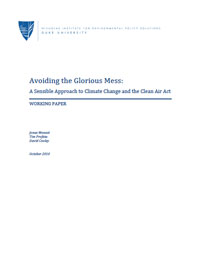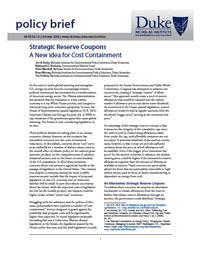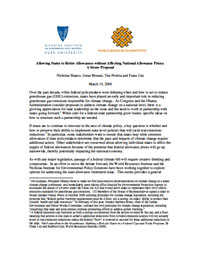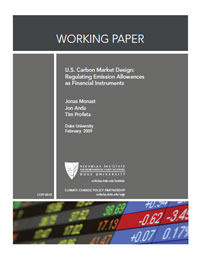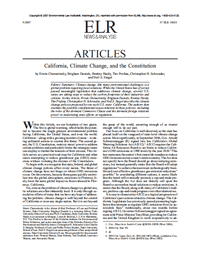Publications
Avoiding the Glorious Mess: A Sensible Approach to Climate Change and the Clean Air Act
In March 2010, the Nicholas Institute for Environmental Policy Solutions at Duke University, the Duke University School of Law, and the Center for Law, the Environment, Adaptation, and Resources (CLEAR) at the University of North Carolina School of Law convened many of the nation’s legal experts on the Clean Air Act for an event in Durham, North Carolina, to examine the options for regulating GHGs under the Act. This report builds upon some of the ideas discussed at that meeting and described in recent publications, with the goal of identifying a viable approach to GHG regulation through the current Clean Air Act in the event that Congress does not act on comprehensive climate legislation.
Sticking Points in Offsets Policy
As the U.S. congressional debate about climate policy matures, the design of a carbon offsets program has become increasingly central to the debate. Offsets have attracted the support of a number of stakeholders because of their promise to provide low-cost, flexible compliance in a carbon trading scheme. They have also evoked a number of concerns in the political discourse, as stakeholders have made different judgments about how to balance the assurance of performance with the efficient administration of the program. This primer outlines and compares a range of policy options that would address key issues in offsets policy in a greenhouse gas cap-and-trade system.
Strategic Reserve Coupons
As the need to tackle global warming and strengthen U.S. energy security become increasingly evident, political momentum has increased for a transformation of America's energy sector. The Obama administration has decleared that the transition to a low-carbon economy is a top White House priority, and integral to America's long-term economic prosperity. In June, the House of Representatives passed legislation (H.R. 2454, America's Climate and Energy Security Act of 2009) to cap emissions of the greenhouse gases that cause global warming.
Issues and Concerns Regarding Design of a Greenhouse Gas Market
In this testimony before the U.S. Senate Committee on Agriculture, Nutrition, and Forestry on September 9, 2009, Timothy Profeta describes the benefits of a market-based climate policy, lays out lessons from recent market failures, describes unique aspects of the U.S. carbon market, and proposes four principles for that market.
Primer on H.R. 2454: Targets and Timetables
Will climate legislation stabilize greenhouse gas concentrations at a level adequate to prevent dangerous anthropogenic interference with the climate system? That's the key question for all climate. Future U.S. emissions reductions are only a piece of the puzzle. The success of the program depends on whether other nations want to pursue equivalent reductions.
Allowing States to Retire Allowances without Affecting National Allowance Prices: A Straw Proposal
Over the past decade, while federal policymakers were debating when and how to act to reduce greenhouse gas emissions, state have played an early and important role in reducing greenhouse gas emissions responsible for climate change. As Congress and the Obama administration consider proposals to address climate change on a national level, there is a growing appreciation for state leadership on the issue and the need to work in partnership with states going forward. While calls for a federal-state partnership grow louder, specific ideas on how to structure such a partnership are needed.
U.S. Carbon Market Design: Regulating Emission Allowances as Financial Instruments
Financial markets typically evolve as they grow over time, and regulatory changes often follow the development of new financial products or respond to failures in the market system. The de novo creation of a U.S. carbon market to reduce the nation's greenhouse gas emissions presents lawmakers with the opportunity to design a transparent, efficient carbon market that builds on the best practices for market regulation and lessons learned from recent market failures.
The U.S. Climate Policy Debate: How Climate Politics are Moving Forward on Capitol Hill and in the White House
The Bush administration's waning days in office herald a likely new approach in U.S. climate policy. Both major candidates in the upcoming presidential election, Sens. Barack Obama and John McCain, have publically embraced approaches to the issue which dramatically differ from the resistence to greenhouse gas regulation that has been espoused by President Bush over the last eight years. Accordingly, while no major climate legislation will likely emerge from Congress before next year at the earliest, the climate debate in the United States is changing.
Designing Offsets Policy for the U.S.
This report covers the principles, challenges and options for encouraging domestic and international emissions reductions and sequestration from uncapped entities as part of a Federal cap-and-trade system for greenhouse gases.
California, Climate Change, and the Constitution
In this promising time for greenhouse gas regulation in California, the state faces some critical choices about how to structure its cap-and-trade program. Its decisions will create different political winners and losers and will have distinct implications for the program's efficiency, equity and administrative costs. Among the many factors that California outght to consider are the constitutional implications of combating leakage and extending a trading market into international territory. This report has first illustrated that the fate of California's ability to control leakage will hinge on whether California can take actions without triggering strict scrutiny under the dormant Commerce Clause.

